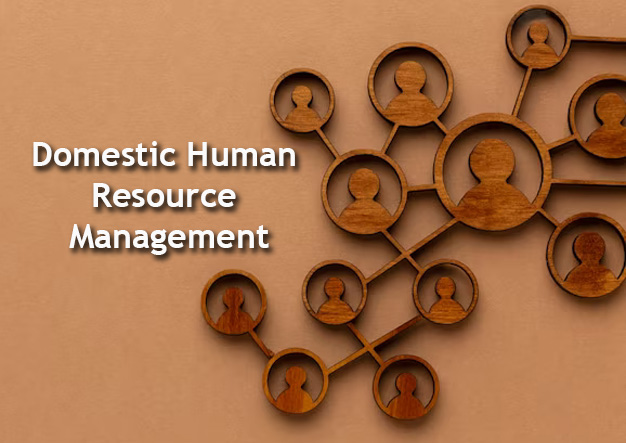Domestic Human Resource Management: Human Resource Management (HRM) is a key job in companies. It’s very important for managing people at work well. When dealing with domestic HRM, we make sure the workers in our country or area match what our company wants to do. This article looks at the importance of Domestic HRM, its main parts, and how it’s changing in today’s business world.

Also See: COMPETENCY BASED HRM, Definition, Components, Benefits
Domestic HRM: Definition and Components
Key Components of Domestic HRM
- Recruitment and Selection
At home, human resource management starts with the selection and hiring process. Companies find people who match their culture and goals. It means making job descriptions, doing interviews and picking people who have needed skills to do the jobs.
- Training and Development
When workers are part of the team, HR makes sure they keep getting better with training programs. These projects help workers get better at their jobs, keep them informed about the latest industry news, and aid in their career growth.
- Performance Management
Looking at and controlling how well workers do their jobs is a big part of local HR in homes. Feedback, goal planning and performance reviews help to match what people do with company goals. This also helps find where workers can get better.
- Compensation and Benefits
Workplace HRM plans and takes care of making good payment schemes that are balanced with the market. This covers things like pay, special rewards, benefits and other goodies that help make staff happy and want to stay.
- Employee Relations
Making good connections between workers and the company is very important for a happy place to work. HRM deals with problems like fixing fights, keeping staff happy, and talking to create a united and team-based job environment.
- Compliance and Legalities
HR in companies must deal with many legal and rule-related things about jobs. This means making sure they follow labor laws, safety rules at work and other regulations which can be different from one country to another.
Also See: How to Improving Business Performance Through Strategic HRM?
Evolving Landscape of Domestic HRM
- Technology Integration
Advancements in technology have transformed the HRM landscape. Automation of routine tasks, the adoption of HR software, and the use of data analytics have streamlined processes, allowing HR professionals to focus on strategic initiatives.
- Remote Work and Flexibility
The global shift towards remote work has challenged traditional HRM practices. Domestic HRM now needs to adapt to new models of work, ensuring that employees remain engaged and productive while working remotely.
- Diversity and Inclusion
Organizations are recognizing the importance of diversity and inclusion in the workplace. Domestic HRM plays a pivotal role in promoting diversity, ensuring equal opportunities, and fostering an inclusive culture that celebrates differences.
Also See: 5p Model Of Hrm: Meaning, Purpose With Diagram
Conclusion
Domestic HRM serves as the heart of organizations, ensuring that the workforce is aligned with the company’s mission and values. By addressing recruitment, training, performance, compensation, and compliance, HRM contributes to the overall success and sustainability of businesses. As the business landscape evolves, HR professionals must remain agile, embracing technological advancements and adapting to changing work paradigms to foster a resilient and dynamic workforce.